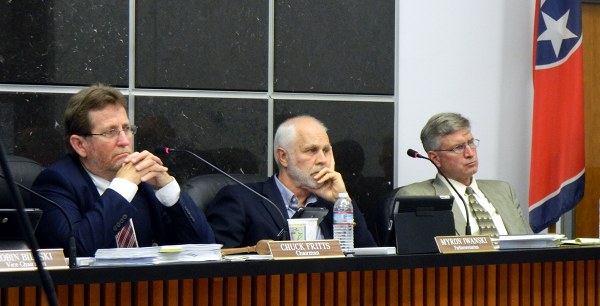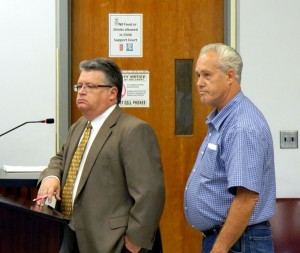
Anderson County Commission Chair Chuck Fritts, left, is pictured above with commissioners Myron Iwanski, center, and Dusty Irwin. Citing an opinion from the County Technical Assistance Service, Fritts on Wednesday said the ouster statute does not apply to the Anderson County law director, the defendant in a controversial ouster suit.
The ouster statute does not apply to the Anderson County law director, the defendant in a controversial ouster suit, Anderson County Commission Chair Chuck Fritts said Wednesday.
Law Director Jay Yeager is essentially a county employee rather than an official, and the ouster statute doesn’t apply to him, said Fritts, citing the opinion of a legal consultant at the University of Tennessee’s County Technical Assistance Service in Nashville.
Citing the CTAS opinion, Fritts said the petitioners who brought the ouster suit against Yeager should pay the legal costs if they lose. The county could pay Yeager’s legal fees if the ouster suit fails or is thrown out of court.
In an opinion sent to Fritts on July 29, CTAS Legal Consultant Stephen Austin said the Anderson County law director is a county employee and not a county officer.
“Accordingly, the ouster statutes are not applicable to the law director,” Austin said. Yeager made a similar argument in a July 11 motion to dismiss filed in Anderson County Chancery Court.

Anderson County Law Director Jay Yeager, left, the defendant in an ouster suit filed by a group of residents is pictured with Lynn Byrge, one of the petitioners, during an Anderson County Commission meeting in July.
The ouster suit was filed by 22 residents in Chancery Court in May and later amended. It now includes 16 grounds for ouster.
Austin said county officials may be ousted, but a public office “must have some permanency and continuity and not be only temporary and occasional.” But Yeager may be terminated at any time by a two-thirds vote of the Legal Services Advisory Committee and Anderson County Commission.
“In my opinion, because the Anderson County law director may be terminated at any time, he is not an official as he does not have a defined term of office,†Austin said.
The Anderson County Commission voted 13-2 in July to cover the costs of attorneys for current and former county officials who might need legal help in the case, such as to respond to subpoenas or to determine whether to waive their attorney-client privilege.
Anderson County Commissioner Dusty Irwin later suggested that motion, made by Commissioner Myron Iwanski, might need to be repealed. Although he is not an attorney, Irwin argued that it appeared that only the county mayor can hire an attorney for the commission, and the legislative body can only hire one.
But Austin said it is his opinion that the county legislative body (the County Commission) has the authority and sole discretion to hire “additional, substitute, or special counsel in the particular situation.†He quoted the 2006 private act that created the law director position: “If a conflict in legal representation develops, the county law director may request that additional or substitute legal counsel be employed by written request to the county commission.â€
The Tennessee attorney general has opined that the state statute cited by Irwin does not control when there is a private act that governs the hiring of the county attorney, as applies in this case, Austin said. The private act then controls, he said.
And a section of that private act says that the “county legislative body may employ special counsel when, in its sole discretion, counsel other than, or in addition to, the law director is needed.â€
Fritts said CTAS “stands behind†the county’s private act, which says the County Commission selects the attorney for the legislative body, not the mayor.
“In other words, our private act trumps the statute (TCA 5-6-12) the mayor and Commissioner Irwin referenced,†Fritts said. “With what I found out today, I can assure you that there will be no hiring of an attorney to represent county commissioners outside of the County Commission office.â€
Iwanski wasn’t available for comment last week. But this week, he said Irwin had made a serious misstatement, and the opinions Irwin expressed in an email to County Commission and the media last week “have no basis in law.â€
“Commissioner Irwin is absolutely wrong that only the mayor can hire legal counsel to represent County Commission,†Iwanski said. “He is also wrong in stating that a commissioner cannot hire their own attorney. I don’t understand why Commissioner Irwin would make such erroneous pubic legal interpretations without consulting with an attorney.â€
Iwanski said county officials could need attorneys to help them navigate legal waters even if they haven’t been accused of wrongdoing. Several officials or employees who aren’t alleged to have done anything wrong but have received subpoenas or letters asking them to waive their attorney-client privilege have said they don’t know how to respond without consulting an attorney.
“This legal counsel is to protect the county from further lawsuits if requested personnel records or attorney-client documents are improperly disclosed,†Iwanski said.
The case has taken on political overtones. Yeager has suggested Anderson County Mayor Terry Frank is behind the ouster suit. Iwanski also suggested the mayor is to blame.
“It is very unfortunate that the series of costly battles that the mayor has been having with the county law director have led to yet another lawsuit,” he said. “The hostility, divisiveness, and lawsuits we have seen over the last two years are costing the county dearly and need to end.”
But Frank has said it’s a “disservice to the petitioners” to suggest that she’s behind the lawsuit.
“It was brought by the citizens,” she said during a recent radio interview featuring the three candidates for mayor in the August 7 election. Frank pointed out that she doesn’t know all of the petitioners, is not one of them, and is not funding the lawsuit.
The mayor, in turn, has taken aim at Iwanski, saying he’s “led the charge on a lot of the animosity” toward her.
A significant part of the debate over the ouster suit has focused on whether commissioners need to hire attorneys to respond to subpoenas or the attorney-client privilege letters. There has also been debate over whether only one attorney should be hired for commissioners and who should do the hiring.
Petitioners and their supporters, as well as Frank, have suggested that commissioners don’t need to hire attorneys to respond to subpoenas requesting records in the case or letters asking them to waive their attorney-client privilege. They have proposed that commissioners instead seek free legal advice from public agencies.
“This lawsuit is not against the commission,” Frank said. “I don’t understand the fear or the ‘lawyering-up.’ If you answer the questions truthfully, why do you need an attorney?â€
“No legal counsel is required, and to safeguard public records, assistance from CTAS and/or the Comptroller’s office is readily available at no cost,†said Andersonville businessman Mark DeVol, one of the petitioners who filed the ouster suit.
But Fritts suggested that the recommendations from those who aren’t attorneys should be ignored.
“CTAS asked me to stop listening to folks who are not attorneys and to go with what they (CTAS) were telling me,†Fritts said.
Other county officials, including Commissioner Steve Mead of Oak Ridge, have said people brought into court through no fault of their own because of county business ought to be represented. The employees in this case haven’t been charged or accused, he said.
“Being your own attorney is a fool’s way of doing business,†Mead said. “They’re being drug into this at their own peril and at the peril of the county.”
It was an argument echoed by Jim Hackworth, one of Frank’s two opponents in the August 7 election, during the recent radio interview on WYSH radio in Clinton.
“Those individuals have rights,” Hackworth said. “They have the right to be protected.”






Mark Caldwell says
Without a doubt, the petitioners who brought the ouster suit against Yeager should pay the entire legal costs if they lose.